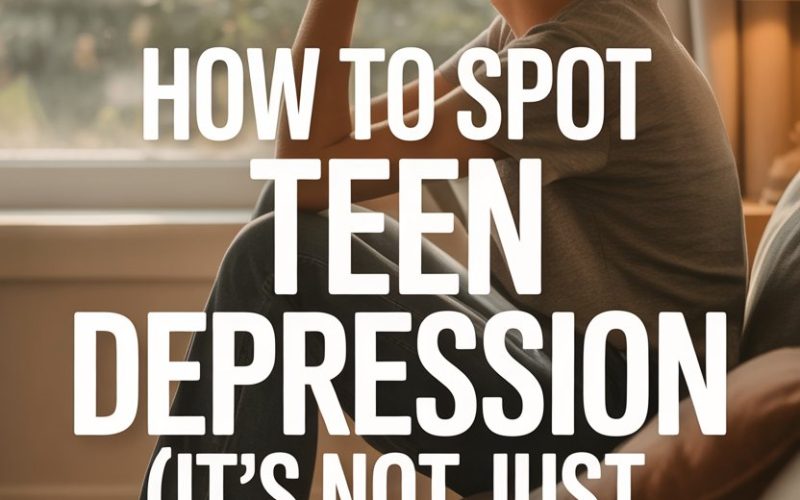Ah, the teenage years—when your sweet child transforms into an unpredictable, eye-rolling cryptid who occasionally emerges from their cave for snacks.
Mood swings? Check. Existential dread? Double check.
But what if those classic teenage behaviors are a sign of something more serious than just hormones or a dodgy maths grade?
Every parent wonders where normal adolescent ups and downs end, and where depression begins.
Spoiler: it’s not always obvious.
That’s why it’s crucial to know what to look for, especially when your schedule leaves you speed-walking through life fuelled by coffee and optimism (mostly coffee).
Teen Depression Is More Than Just a Bad Day
We all know teens can be moody. One minute they’re waxing poetic about the meaning of life; the next, they’re slamming doors over who finished the milk. Still, depression is something else entirely.
According to the CDC, an estimated 1 in 5 teens will experience depression by the time they reach adulthood.
Unlike everyday moodiness, depression sticks around. It isn’t just a grumpy morning or a slammed door—it’s a persistent shift in your child’s thoughts, feelings, energy, and behaviour.
The stakes are real, so early recognition really matters.
Spotting the Signs: When Is It Time to Worry?
Let’s be honest: teens are mysterious creatures. They might keep you as informed about their feelings as MI6 does about state secrets. Still, depression leaves clues.
Look for a cluster of these changes that last more than two weeks:
- A sudden drop in motivation or energy (not just post-PE lethargy)
- Loss of interest in friends, hobbies, or activities they used to love
- Sleeping too much—or hardly at all
- Big shifts in appetite or weight
- Irritability or anger that feels different from their usual snappiness
- Trouble concentrating or remembering things
- Feeling hopeless, worthless, or unusually guilty
- Talking about death or disappearing (no, not only when being asked to walk the dog)
- Unexplained aches and pains
Not just a single bad day, but a pattern you can’t chalk up to exam stress or a break-up.
Behavioural Changes: The Not-So-Classic Red Flags
Depression doesn’t always look like sadness. In fact, many teens mask their feelings. You might notice:
- Withdrawing from mates or family activities—suddenly every family dinner is met with the enthusiasm of a trip to the dentist
- Drop in school performance (your straight-A kid now brings home a report card best left unopened)
- Lashing out, picking fights, or being uncharacteristically rude
- Risk-taking: driving too fast, drinking, or experimenting with substances
- Spending endless hours on their phone, but never answering yours (classic)
Parents often brush these off as typical teen behaviour. Hey, maybe it is. But if the changes are dramatic, consistent, and your gut says something’s off, it’s time to trust your instincts.
The Social Media Mirror
Social media is the modern teen’s lifeline—and sometimes their lifeboat with a hole in it.
Research from the Royal Society for Public Health found that social platforms can worsen feelings of anxiety and depression in teens. Pay attention to what your child posts, likes, or comments on.
Are they suddenly following sad or nihilistic accounts? Are they sharing dark memes or song lyrics about feeling numb or invisible?
This digital breadcrumb trail can reveal a lot. Just don’t go full “undercover agent” and grill them about every post, or you’ll be rewarded with more doors slammed than answers.
Physical Complaints With No Clear Cause
Headaches, stomach aches, back pain—sound familiar? Emotional distress often shows up physically, especially in teens who aren’t great at talking about their feelings (which is most of them, frankly).
If your child is suddenly making more trips to the school nurse or begging off sports with sketchy symptoms, don’t dismiss it as trying to skive off PE.
While it’s important to rule out genuine medical issues, keep your antennae up for physical complaints that don’t have an obvious cause. Sometimes, the body shouts what the mouth can’t say.
Irritability: Not Just Cranky, but Depressed
It’s easy to chalk up your teenager’s snarky attitude to “just being a teen.” But for many, especially boys, depression shows up as irritability instead of sadness.
They’re not just annoyed that you exist (classic), but genuinely on edge, angry, or intolerant of even minor setbacks.
Ever feel like you’re tiptoeing around a bear with a migraine? That persistent edge could be a sign that something deeper is going on.
The Disappearing Act
From sports clubs to drama group, teens are usually all about their tribe (even if they pretend not to care). One of the biggest warning signs is when your social butterfly suddenly morphs into a hermit, retreating from friends and cancelling plans.
Isolation feeds depression, and depression feeds isolation—a vicious cycle. If you notice your child pulling away not just from family, but from everyone, it’s time to check in.
Words Matter: How Teens Talk (or Don’t)
Language is a window into how your teen sees themselves and their world. Tune in to what they say—directly or online. Phrases like “I’m just a burden,” “Nobody would miss me,” or “Nothing matters” should never be brushed off as drama.
Even if your kid is fluent in sarcasm or speaks in memes, listen for dark or hopeless themes. Sometimes they’ll test the waters to see if you notice; your reaction matters more than you think.
When to Trust Your Gut
No one knows your child like you do. If you sense something is off, don’t wait for the “classic” signs. Parental intuition is powerful—yes, even if your teen swears you’re clueless.
Don’t fall into the trap of assuming they’ll “snap out of it” or that it’s just a phase. Early intervention really does make a difference, and you don’t need to wait until things are dire to ask for help.
What to Do if You’re Worried
Spotting signs is only half the battle. What next? For starters, don’t panic.
You don’t have to solve everything overnight, and you certainly don’t need a psychology degree.
Pick a calm moment. Ask gentle, open-ended questions. “You haven’t seemed yourself lately—want to talk about it?” works better than “Why are you being so difficult?” (Tempting, I know.)
If your teen won’t talk, reassure them you’re there. Sometimes, just knowing you’ve noticed makes a world of difference. If they open up, listen more than you talk.
Resist the urge to jump in with solutions, lectures, or horror stories from your own youth.
When to Seek Professional Help
If your child’s behaviour has changed for more than two weeks, and nothing you try seems to help, it’s time to call in reinforcements. Start with your GP, who can assess and refer to a mental health professional if needed.
The NHS offers support through CAMHS (Child and Adolescent Mental Health Services), but private therapists and online services are also options if waiting lists drag on.
If your child talks about self-harm or suicide, take it seriously every single time. Remove anything dangerous from home, stay close, and get help immediately from a crisis service or A&E.
Supporting Your Teen at Home
While you can’t “fix” depression with home remedies, small changes make a big impact.
- Keep routines predictable, but not rigid.
- Prioritise sleep (yes, even if it means confiscating the phone after 11pm).
- Encourage gentle exercise—even if it’s just a walk with the dog.
- Serve regular meals; blood sugar crashes help no one.
- Reduce pressure where you can—school, sports, social life shouldn’t feel like the Hunger Games.
- Keep the lines of communication gentle and open, even when you get one-word answers.
Where to Find Extra Support
You don’t have to muddle through this alone. Charities like YoungMinds and Mind offer resources, helplines, and tips for parents.
There’s no shame in asking for guidance—or for a bit of reassurance that you’re not the only one hiding in the loo for a breather.
Taking Care of Yourself
Supporting a struggling teen is tough. It can feel isolating, overwhelming, and—let’s be honest—a bit terrifying. Make sure you have someone to confide in, whether that’s a mate, partner, or professional.
Burnt-out parents can’t pour from an empty cup, no matter how many times you try.
If you’re feeling helpless or blaming yourself, stop right there. Depression isn’t caused by “bad parenting” or too many screens.
It’s a health issue, not a failure. You’re already doing more than you know by showing up.
Hope is Real: Teens Recover
Depression is treatable. With the right support, most teens bounce back, rediscovering joy in things they once loved (and even risking a rare smile at your jokes—you never know).
Early action means better recovery rates and less disruption to your child’s future.
Keep showing up, keep asking questions, and keep being the safe place your teen can turn to—even if their gratitude comes in the form of sullen silence.
You’ve Got This (Even If It Doesn’t Feel Like It Right Now)
Teen depression is sneaky, but it’s not invisible. Your willingness to notice, ask, and act could make all the difference.
Even in the busiest, messiest, most eye-rolling of family lives, there’s always room for hope.
And yes, you can finish your coffee first. You’ll need the energy.





